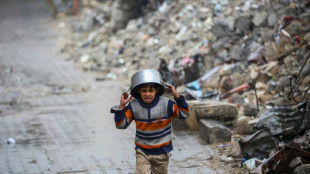
-
 French court cracks down on Corsican language use in local assembly
French court cracks down on Corsican language use in local assembly
-
Prosecutors seek up to 14-year terms for French rape trial defendants

-
 Russia expels UK diplomat accused of espionage
Russia expels UK diplomat accused of espionage
-
Israeli security cabinet to discuss ceasefire as US says deal 'close'

-
 COP29 president blames rich countries for 'imperfect' deal
COP29 president blames rich countries for 'imperfect' deal
-
Stocks retreat, dollar mixed on Trump tariff warning

-
 No regrets: Merkel looks back at refugee crisis, Russia ties
No regrets: Merkel looks back at refugee crisis, Russia ties
-
IPL history-maker, 13, who 'came on Earth to play cricket'

-
 Ukraine says Russia using landmines to carry out 'genocidal activities'
Ukraine says Russia using landmines to carry out 'genocidal activities'
-
Prosecutors seek up to 12-year terms for French rape trial defendants

-
 'Record' drone barrage pummels Ukraine as missile tensions seethe
'Record' drone barrage pummels Ukraine as missile tensions seethe
-
Laos hostel staff detained after backpackers' deaths

-
 Hong Kong LGBTQ advocate wins posthumous legal victory
Hong Kong LGBTQ advocate wins posthumous legal victory
-
Ukraine says cannot meet landmine destruction pledge due to Russia invasion

-
 Rod Stewart to play Glastonbury legends slot
Rod Stewart to play Glastonbury legends slot
-
Winter rains pile misery on war-torn Gaza's displaced

-
 'Taiwan also has baseball': jubilant fans celebrate historic win
'Taiwan also has baseball': jubilant fans celebrate historic win
-
Russia pummels Ukraine with 'record' drone barrage

-
 Paul Pogba blackmail trial set to open in Paris
Paul Pogba blackmail trial set to open in Paris
-
China's Huawei unveils 'milestone' smartphone with homegrown OS

-
 Landmine victims gather to protest US decision to supply Ukraine
Landmine victims gather to protest US decision to supply Ukraine
-
Indian rival royal factions clash outside palace

-
 Equity markets retreat, dollar gains as Trump fires tariff warning
Equity markets retreat, dollar gains as Trump fires tariff warning
-
Manga adaptation 'Drops of God' nets International Emmy Award

-
 China's Huawei launches 'milestone' smartphone with homegrown OS
China's Huawei launches 'milestone' smartphone with homegrown OS
-
Philippine VP denies assassination plot against Marcos

-
 Four Pakistan security forces killed as ex-PM Khan supporters flood capital
Four Pakistan security forces killed as ex-PM Khan supporters flood capital
-
Hong Kong's legal battles over LGBTQ rights: key dates

-
 US lawmakers warn Hong Kong becoming financial crime hub
US lawmakers warn Hong Kong becoming financial crime hub
-
Compressed natural gas vehicles gain slow momentum in Nigeria

-
 As Arctic climate warms, even Santa runs short of snow
As Arctic climate warms, even Santa runs short of snow
-
Plastic pollution talks: the key sticking points

-
 Indonesia rejects Apple's $100 million investment offer
Indonesia rejects Apple's $100 million investment offer
-
Pakistan police fire tear gas, rubber bullets at ex-PM Khan supporters

-
 Ronaldo double takes Al Nassr to brink of AFC Champions League last 16
Ronaldo double takes Al Nassr to brink of AFC Champions League last 16
-
Pakistan police fire tear gas, rubber bullets at pro-Khan supporters

-
 Hong Kong same-sex couples win housing, inheritance rights
Hong Kong same-sex couples win housing, inheritance rights
-
Indonesia digs out as flooding, landslide death toll hits 20

-
 Liverpool's old guard thriving despite uncertain futures
Liverpool's old guard thriving despite uncertain futures
-
Mbappe takes reins for Real Madrid in Liverpool clash

-
 As AI gets real, slow and steady wins the race
As AI gets real, slow and steady wins the race
-
China's Huawei to launch 'milestone' smartphone with homegrown OS

-
 Porzingis and Morant make triumphant NBA returns
Porzingis and Morant make triumphant NBA returns
-
Hong Kong top court affirms housing, inheritance rights for same-sex couples

-
 Philippines, China clashes trigger money-making disinformation
Philippines, China clashes trigger money-making disinformation
-
Most Asian markets drop, dollar gains as Trump fires tariff warning

-
 England 'not quivering' ahead of New Zealand Test challenge
England 'not quivering' ahead of New Zealand Test challenge
-
Bethell to bat at three on England Test debut against New Zealand

-
 Trump vows big tariffs on Mexico, Canada and China
Trump vows big tariffs on Mexico, Canada and China
-
New Zealand and England to play for Crowe-Thorpe Trophy


Conflict wounds Russian and Ukrainian currencies
Their economies rocked by conflict, Russian and Ukrainian authorities have deployed different tactics to defend their weakened currencies, with varying degrees of success.
The Russian ruble, which was trading around 80 to the dollar before Moscow sent troops into Ukraine on February 24, lost 40 percent of its value in the following days, slumping to an unprecedented level of 150 to the dollar.
It has since clawed back much of that, trading at around 105 rubles to the dollar, seemingly having profited from talks between Moscow and Kyiv to end the conflict.
Despite having been cut off from much of its foreign currency reserves due to Western sanctions, the Russian central bank has nevertheless occasionally sold some to support the ruble.
Together with strict capital controls that require exporters to sell most of their foreign currency to the central bank and limits on consumers accessing their holdings, the measures appear to be working.
"During the past 10 years the central bank intervened directly only several times, which now works in favour of the market exchange rate stabilising," said analyst Alexander Kudrin at investment bank Aton.
"The first signs of stabilisation are already appearing," he added.
Russian economy expert Janis Kluge at the Berlin-based SWP think tank tweeted recently that the ruble was strengthening thanks to strict capital controls and large oil and gas revenues following the initial sanctions "shock".
In Ukraine, which is under martial law, the central bank has suspended all currency trading and set a fixed exchange rate of approximately 29 hryvnia to the dollar.
It also banned foreign currency withdrawals and most cross-border payments.
Volodymyr Lepushynskyi, director of monetary policy at the Ukrainian central bank, said officials had a plan already prepared in case of conflict.
"We always hoped that we would not need to implement it, but we were ready," he told AFP.
"Thanks to the experience of working in administrative constraints, we had a clear understanding of what needs to be done to prevent destabilisation of the financial sector and to establish its effective operation under such circumstances."
- Black market danger -
Finance Minister Sergiy Marchenko recently said on Ukrainian television that the central bank's measures created "certain conditions under which there is exchange rate stability today".
He also noted that Ukraine has received support from its international partners including the European Union and World Bank, adding that the International Monetary Fund has approved a $1.4 billion emergency aid programme for Ukraine.
Ousmene Mandeng, a visiting fellow at the London School of Economics, warned that while the measures may be justified by the extreme circumstances, they carry certain risks.
"The suspension of foreign exchange trading is de facto equivalent to a price freeze and... if prolonged can lead to a black market for foreign exchange and de facto multiple currency" use, he told AFP.
"A resumption of foreign exchange trading ... would be desirable to minimise implied distortions," Mandeng added, noting that the Ukrainian central bank had eased some restrictions and that some interbank foreign exchange market operations appear to be slowly resuming.
The central bank's Lepushynskyi said it plans to relax restrictions as soon as it sees room to do so.
"After the liberation of Ukraine from Russian invaders and the normalisation of the economic situation, we will resume the full operation of the foreign exchange market and lift currency restrictions to pre-war levels in the shortest possible time," he said.
Mandeng also noted that Ukraine had about $28 billion in foreign currency reserves at the beginning of the month.
"That should offer some comfort for the short term but may eventually need to be replenished," he said.
Ukrainians fleeing the country with hryvnia in their pockets are facing the most direct problems due to lack of convertibility of the currency.
The European Commission's Executive Vice-President Valdis Dombrovskis said recently that the commission was working together with the European Central Bank "to provide some kind of convertibility assistance so that people are able to convert at least certain amounts of their savings in hryvnia into euros".
M.Furrer--BTB
